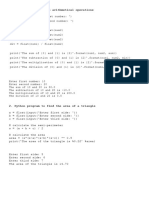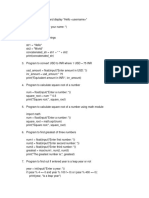0 ratings0% found this document useful (0 votes)
19 viewsPython
The document discusses code developed in Python including matrix multiplication, twin primes, permutation and combination formulas, determining if a number is Armstrong, product of digits, and other number-related codes. It also mentions working with SQL.
Uploaded by
Shreyansh GarhewalCopyright
© © All Rights Reserved
We take content rights seriously. If you suspect this is your content, claim it here.
Available Formats
Download as TXT, PDF, TXT or read online on Scribd
0 ratings0% found this document useful (0 votes)
19 viewsPython
The document discusses code developed in Python including matrix multiplication, twin primes, permutation and combination formulas, determining if a number is Armstrong, product of digits, and other number-related codes. It also mentions working with SQL.
Uploaded by
Shreyansh GarhewalCopyright
© © All Rights Reserved
We take content rights seriously. If you suspect this is your content, claim it here.
Available Formats
Download as TXT, PDF, TXT or read online on Scribd
You are on page 1/ 1
Programming in Python
• Developed a code on matrix multiplication without using external libraries.
• Developed a code to find twin primes.
• Developed a code for permutation and combination formula using recursive
function.
• Code to determine a number is Armstrong or not.
• Code for product of individual digits of a given number.
• Code for Multiplicative digital root (MDR) and MPersistence.
• Code to find if a number is perfect.
• Code to find pair of amicable numbers.
• Code to create a list cube of even numbers using map and filter function.
SQL
• Worked on
# Prime Factors of a number
import numpy as np
def primen(m):
if m>2 and m%2==0
return False
d=True
for i in range(2,(m/2)+1):
if m%i==0:
d=False
break
return d
lst=[]
def primef(x):
"""
This gives prime factors of a number
"""
if not primen(x):
for k in range(2,x):
if primen(k) and x%k==0:
print(k)
lst.append(k)
c=x/k
#primef(int(c))
if primen(x):
print(str(x))
lst.append(x)
#if primen(k)==True and x/k==1:
#print(x)
#break
You might also like
- Class 11 CBSE Computer Science General Practical67% (6)Class 11 CBSE Computer Science General Practical19 pages
- Informatics Practices Project File:: Name: Shambhavi Shekhar Singh Class: 11 A' ScienceNo ratings yetInformatics Practices Project File:: Name: Shambhavi Shekhar Singh Class: 11 A' Science10 pages
- 20 Python Coding Questions and Answers For ProgrammingNo ratings yet20 Python Coding Questions and Answers For Programming10 pages
- II Term Std 10 - Revision 5 for Robotics & AINo ratings yetII Term Std 10 - Revision 5 for Robotics & AI19 pages
- ABHAY 12R210: Avionics Requirement SheetNo ratings yetABHAY 12R210: Avionics Requirement Sheet2 pages

































































